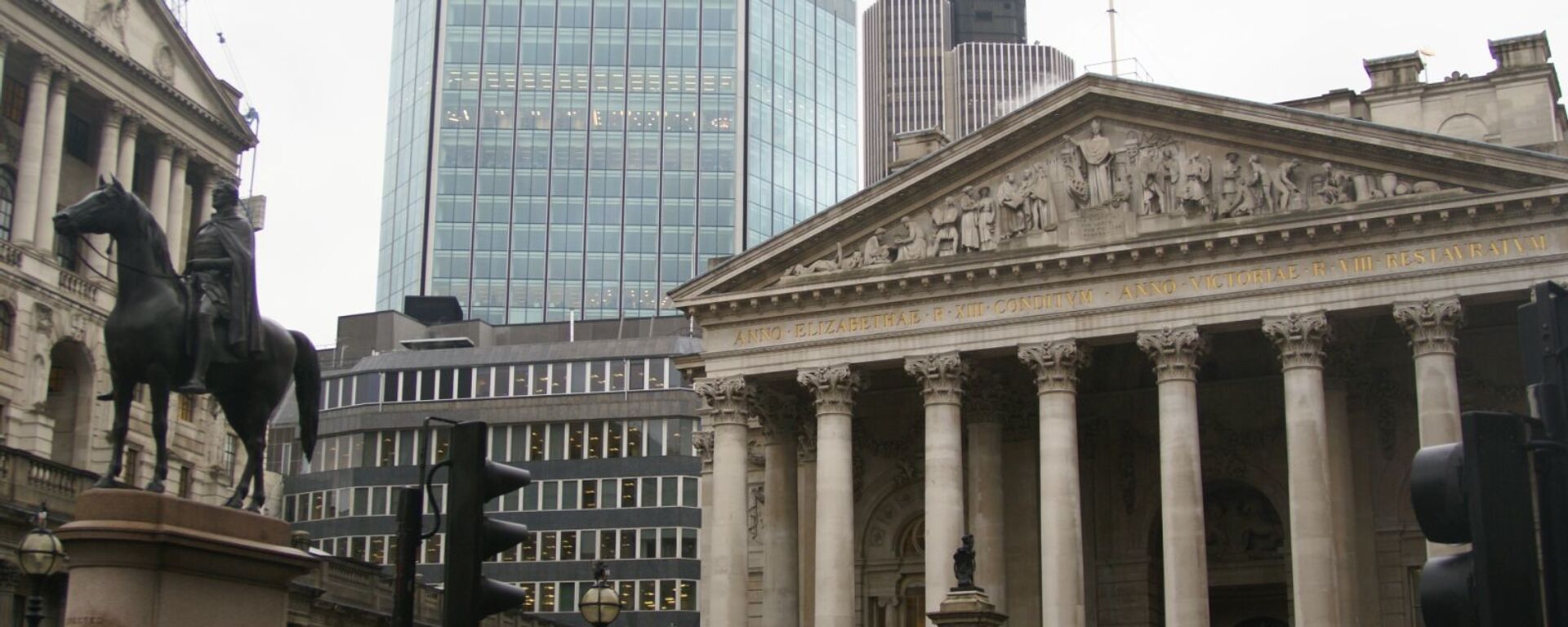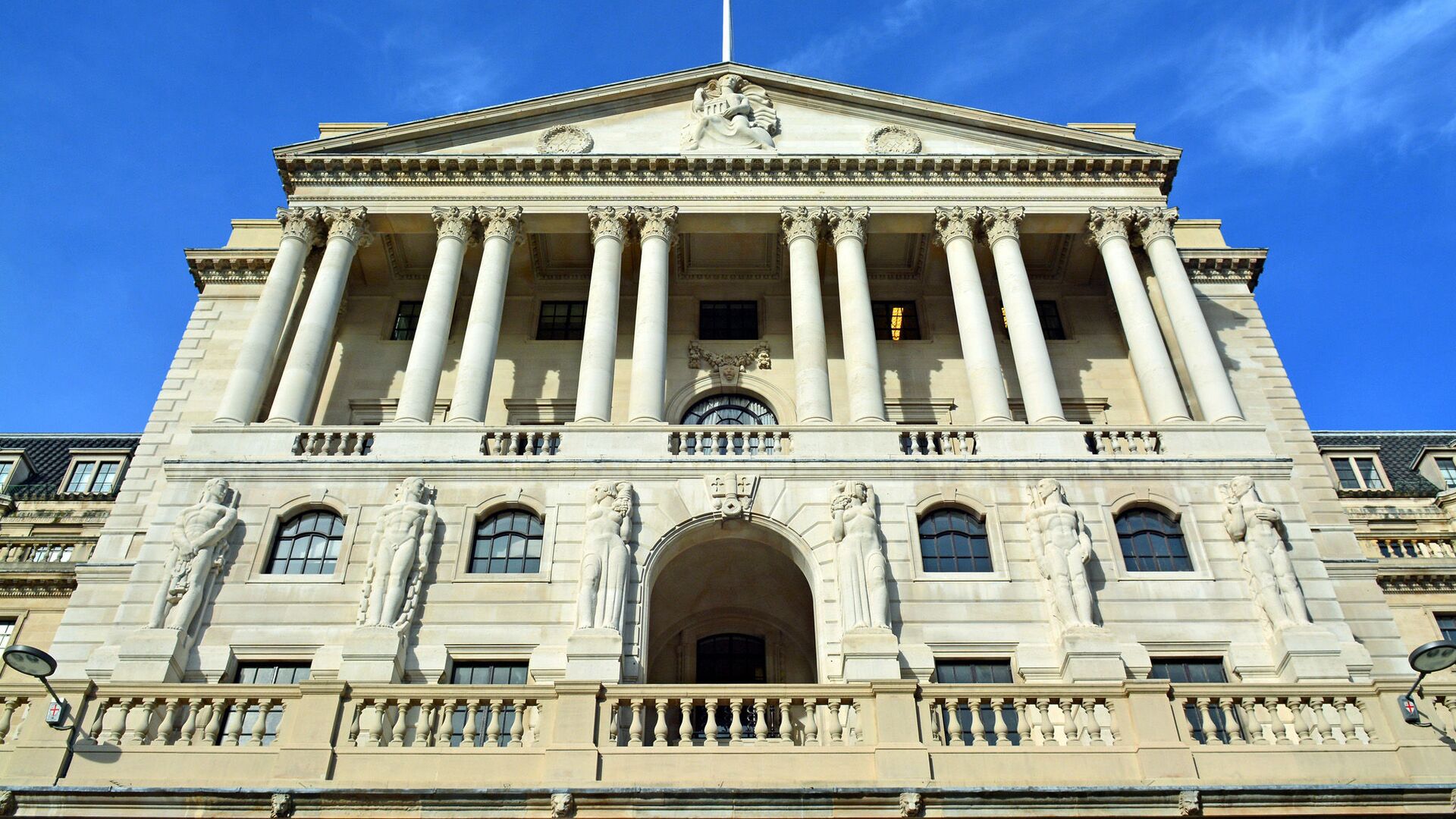https://sputnikglobe.com/20220923/uk-may-be-in-recession-says-boe-as-it-warns-support-package-risks-adding-to-inflationary-pressure-1101113153.html
UK May Be in Recession, Says BoE as It Warns Support Package Risks 'Adding to Inflationary Pressure’
UK May Be in Recession, Says BoE as It Warns Support Package Risks 'Adding to Inflationary Pressure’
Sputnik International
This Friday the UK's Chancellor of the Exchequer, Kwasi Kwarteng, is expected to unveil his so-called emergency tax-cutting mini-budget outlining the key... 23.09.2022, Sputnik International
2022-09-23T05:51+0000
2022-09-23T05:51+0000
2023-05-28T15:21+0000
world
bank of england
kwasi kwarteng
interest rates
recession
andrew bailey
inflation
united kingdom (uk)
https://cdn1.img.sputnikglobe.com/img/107844/98/1078449817_0:114:2048:1266_1920x0_80_0_0_d288cbbeb30b8a69789fb10424eb2a34.jpg
The Bank of England (BoE) governor, Andrew Bailey, warned Chancellor Kwasi Kwarteng before Friday’s fiscal event that the UK economy may already be in recession and interest rates may be raised even further after the tax-cutting mini-budget is unveiled, UK media outlets reported.On 22 September, just as Kwarteng was preparing to reveal measures conceived by Prime Minister Liz Truss' government to help households and businesses cope with the cost of living crunch, the BoE raised interest rates by 0.5 percentage points from 1.75 percent to 2.25 percent.The bank’s seventh consecutive rise to a level last seen during the global financial crisis of 2008 came as inflation in the UK stood at 9.9 percent year-on-year - well above the Bank’s 2 percent target. Furthermore, the BOE predicted that the GDP would contract by 0.1 percent in the third quarter as consumer spending slumps and the manufacturing and construction sectors experience weaker activity. This is down from a previous forecast of 0.4 percent growth.At its meeting, the BoE’s monetary policy committee (MPC) emphasized that the economic strategies drummed up by Truss’ new government were fraught with further inflationary pressures.According to Bailey, the MPC would be assessing the impact of the government’s plan, presupposing introducing energy price caps and tax cuts, ahead of the committee’s next borrowing decision in November.“All else being equal ... this will add to inflationary pressures in the medium term,” Bailey warned Kwarteng about the household energy cap.The BoE said in its release on Thursday that, along with the continuing volatility in wholesale gas prices, there had been signs since August of “continuing strength in domestically generated inflation.” According to the Bank of England, the consumer prices index would peak at just below 11 percent this autumn rather than exceed 13 percent. However, the Bank added:‘Breaking ‘Cycle of Stagnation’The BoE warning comes as the Chancellor of the Exchequer, Kwarteng, is expected to unveil the government’s major package of support measures designed to break the economy’s “cycle of stagnation” through tax cuts and infrastructure reforms.In his speech to the House of Commons, Kwarteng will unveil a package of more than 30 points as part of the Treasury’s “Growth Plan”, including relief for households facing high energy bills.The announcements will include an estimated £30Bln of tax cuts, such as reversing the rise in National Insurance (introduced by Boris Johnson's government in April to pay for social care and tackling the National Health Service backlog), scrapping the planned rise in corporation tax from 19 percent to 25 percent, and removing green levies. Ditching the cap on bankers’ bonuses is reportedly to come as part of wider City deregulation.Among the forthcoming announcements are new investment zones for 38 local and mayoral authorities in England that will offer “targeted” tax cuts for local businesses allowing companies to “increase productivity” and create new jobs. Furthermore, some 100 new infrastructure projects are to be accelerated across transport, energy and the digital sphere to achieve a targeted economy growth rate of 2.5 percent a year.In defense of reported plans to lift the cap on bankers bonuses and the ban on fracking, the Chancellor is expected to tell MPs that the new government intends to be “bold and unashamed in pursuing growth - even where that means taking difficult decisions”.
https://sputnikglobe.com/20220922/bank-of-england-raises-interest-rate-by-half-a-point-as-recession-looms-1101086804.html
https://sputnikglobe.com/20220921/uk-government-unveils-energy-support-plan-for-hard-hit-businesses-1101037297.html
https://sputnikglobe.com/20220922/uk-government-lifts-ban-on-shale-gas-fracking-in-response-to-energy-crisis-1101076777.html
united kingdom (uk)
Sputnik International
feedback@sputniknews.com
+74956456601
MIA „Rossiya Segodnya“
2022
News
en_EN
Sputnik International
feedback@sputniknews.com
+74956456601
MIA „Rossiya Segodnya“
Sputnik International
feedback@sputniknews.com
+74956456601
MIA „Rossiya Segodnya“
bank of england, kwasi kwarteng, interest rates, recession, andrew bailey, inflation, united kingdom (uk)
bank of england, kwasi kwarteng, interest rates, recession, andrew bailey, inflation, united kingdom (uk)
UK May Be in Recession, Says BoE as It Warns Support Package Risks 'Adding to Inflationary Pressure’
05:51 GMT 23.09.2022 (Updated: 15:21 GMT 28.05.2023) This Friday the UK's Chancellor of the Exchequer, Kwasi Kwarteng, is expected to unveil his so-called emergency tax-cutting mini-budget outlining the key economic strategies that Prime Minister Liz Truss' new government is relying on to help individuals and businesses cope with the cost of living crisis.
The Bank of England (BoE) governor, Andrew Bailey, warned Chancellor Kwasi Kwarteng before Friday’s fiscal event that the UK economy may already be
in recession and interest rates may be raised even further after the
tax-cutting mini-budget is unveiled, UK media outlets reported.
On 22 September, just as Kwarteng was preparing to reveal measures conceived by Prime Minister Liz Truss' government to help households and businesses cope with the cost of living crunch, the BoE raised interest rates by 0.5 percentage points from 1.75 percent to 2.25 percent.

22 September 2022, 13:52 GMT
The bank’s seventh consecutive rise to a level last seen during the global financial crisis of 2008 came as inflation in the UK stood at 9.9 percent year-on-year - well above the Bank’s 2 percent target. Furthermore, the BOE predicted that the GDP would contract by 0.1 percent in the third quarter as consumer spending slumps and the manufacturing and construction sectors experience weaker activity. This is down from a previous forecast of 0.4 percent growth.
At its meeting, the BoE’s monetary policy committee (MPC) emphasized that the economic strategies drummed up by Truss’ new government were fraught with further
inflationary pressures.
According to Bailey, the MPC would be assessing the impact of the government’s plan, presupposing introducing energy price caps and tax cuts, ahead of the committee’s next borrowing decision in November.
“All else being equal ... this will add to inflationary pressures in the medium term,” Bailey warned Kwarteng about the household energy cap.
“Should the outlook suggest more persistent inflationary pressures, including from stronger demand, the committee will respond forcefully, as necessary,” the Bank’s governor wrote in the scheduled letter to the Chancellor of the Exchequer.
The BoE said in its release on Thursday that, along with the continuing volatility in wholesale gas prices, there had been signs since August of “continuing strength in domestically generated inflation.” According to the Bank of England, the consumer prices index would peak at just below 11 percent this autumn rather than exceed 13 percent. However, the Bank added:
“The labour market is tight and domestic cost and price pressures remain elevated. While the [energy bill subsidy] reduces inflation in the near term, it also means that household spending is likely to be less weak than projected in the August Report over the first two years of the forecast period.”
‘Breaking ‘Cycle of Stagnation’
The BoE warning comes as the Chancellor of the Exchequer, Kwarteng, is expected to unveil the government’s major
package of support measures designed to break the economy’s “cycle of stagnation” through tax cuts and infrastructure reforms.
In his speech to the House of Commons, Kwarteng will unveil a package of more than 30 points as part of the Treasury’s “Growth Plan”, including relief for households facing high energy bills.

21 September 2022, 11:41 GMT
The announcements will include an estimated £30Bln of
tax cuts, such as reversing the rise in National Insurance (introduced by Boris Johnson's government in April to pay for social care and tackling the National Health Service backlog), scrapping the planned rise in corporation tax from 19 percent to 25 percent, and removing green levies. Ditching the cap on bankers’ bonuses is reportedly to come as part of wider City deregulation.
Among the forthcoming announcements are new investment zones for 38 local and mayoral authorities in England that will offer “targeted” tax cuts for local businesses allowing companies to “increase productivity” and create new jobs. Furthermore, some 100 new infrastructure projects are to be accelerated across transport, energy and the digital sphere to achieve a targeted economy growth rate of 2.5 percent a year.
“Growth is not as high as it needs to be, which has made it harder to pay for public services, requiring taxes to rise. This cycle of stagnation has led to the tax burden being forecast to reach the highest levels since the late Forties. We are determined to break that cycle. We need a new approach for a new era focused on growth,” the Chancellor is expected to say, according to UK media reports.
In defense of reported plans to lift the cap on bankers bonuses and the
ban on fracking, the Chancellor is expected to tell MPs that the new government intends to be “bold and unashamed in pursuing growth - even where that means taking difficult decisions”.

22 September 2022, 11:04 GMT





